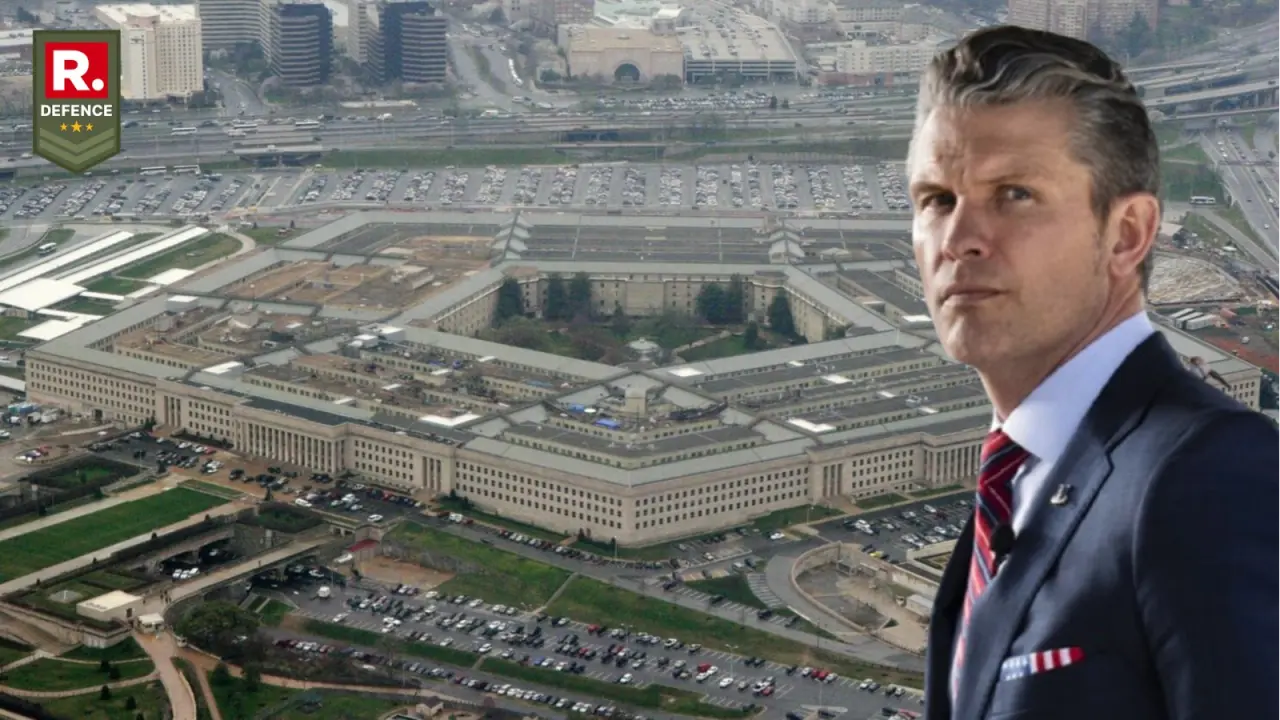Updated 27 March 2025 at 16:49 IST
Did a Text Message Just Compromise U.S. Military Operations? Pentagon in Demage Control Mode
Reports have surfaced that U.S. Defense Secretary Pete Hegseth leaked sensitive details in a private Signal chat ahead of the March 16 airstrikes in Yemen.
- Defence News
- 5 min read

Washington, USA - The Pentagon is in damage control mode after reports emerged that U.S. Defense Secretary Pete Hegseth leaked sensitive military strike details in a non-government group chat ahead of airstrikes in Yemen earlier this month. The revelation has triggered a fierce political firestorm, with critics accusing the White House of downplaying a significant security lapse while allies insist no classified information was compromised.
At the heart of the controversy are text messages sent by Hegseth in a private Signal chat that included National Security Adviser Mike Waltz, Vice President JD Vance, and others. According to transcripts published by The Atlantic, the messages contained detailed timestamps of when F-18 fighter jets would take off and strike targets, as well as the launch sequence of Tomahawk missiles—information that some defence officials insist should have remained classified.
What Was Leaked?
The conversation in question took place just hours before the U.S. launched a coordinated strike on Houthi targets in Yemen on March 16. Hegseth’s texts reportedly outlined precise details of the attack’s execution, including the departure times of aircraft and missile launches targeting enemy infrastructure. The situation took a bizarre turn when it was revealed that The Atlantic’s Editor-in-Chief, Jeffrey Goldberg, was accidentally included in the chat, giving the press a front-row seat to sensitive military discussions.

The White House has aggressively pushed back against accusations that the texts contained classified material. President Donald Trump dismissed the concerns, saying Tuesday that no sensitive information was shared. His spokesperson, Karoline Leavitt, reiterated the point on Wednesday, accusing critics of “exaggeration” and “fear-mongering” instead of focusing on the success of the airstrikes.
Advertisement
Pentagon officials backed the administration, with Hegseth himself insisting that the messages contained no war plans—just “attack plans.” That distinction, however, is unlikely to calm the storm, as former defence officials argue that real-time attack details are often more sensitive than broader war strategies.
A Dangerous Precedent? US Congress Steps In
Critics, including former military planners, have slammed the administration’s handling of the situation. Mick Mulroy, a former Pentagon official responsible for Middle East operations, said the information shared in the chat was “highly classified” and could have put American forces at risk.
Advertisement
Another former defence official, speaking anonymously, said the level of detail in Hegseth’s texts could have allowed the Houthis to reposition assets, escape the strike, or even mount a counterattack. “We’re talking about a group that has been launching drones and missiles at U.S. ships for months,” the official said. “Any heads-up, even accidental, is dangerous.”

The risk was further compounded by Hegseth specifying that the strike aircraft were F-18s—carrier-based fighters. That detail alone, experts warn, could have allowed hostile forces to track the launch point and increase the risk of retaliation against U.S. carriers operating in the region.
Senator Mark Kelly, a former Navy pilot, didn’t mince words: “If the enemy knows where and when your planes are coming, it’s a lot easier for them to shoot you down.”

The political fallout has been swift. Senate Armed Services Committee Chairman Roger Wicker has already announced an investigation into the incident, calling the leaked information “sensitive enough that I would have wanted it classified.”
House Republicans have also piled on, with Rep. Don Bacon criticizing the White House’s attempts to downplay the leak. “The White House is in denial,” he said, “This was sensitive data, plain and simple.” Meanwhile, pressure is mounting on Hegseth to resign, with over 20 Democratic lawmakers—including House Minority Leader Hakeem Jeffries—calling for his ouster.
The Bigger Picture
Beyond the immediate controversy, defence analysts warn that the exposure of internal military deliberations could have long-term consequences. A former Pentagon official noted that adversaries like Russia, China, and Iran could now have a clearer understanding of how the administration thinks, plans, and coordinates military strikes.

“The messages reveal decision-making patterns, internal debates, and strategic tradeoffs,” the official said. “That information is valuable—not just to the Houthis, but to any foreign power trying to decipher how America wages war.”
Despite the Drama, the Bombing Continues
While Washington scrambles to contain the fallout, the U.S. military hasn’t slowed down operations in Yemen. According to Pentagon officials, American forces have now struck 100 Houthi targets and will continue attacks until the militant group stops threatening commercial shipping in the Red Sea.
The mission itself mirrors the approach taken by the Biden administration, which also conducted airstrikes against the Houthis last year. However, unlike previous administrations, the Trump White House now faces questions not just about the effectiveness of the strikes—but whether careless communication at the highest levels put American troops in unnecessary danger.
As investigations begin, one thing is clear: this isn’t just about one text message. It’s about how the world’s most powerful military protects its secrets—and whether its own leaders are breaking the rules.
Published By : Yuvraj Tyagi
Published On: 27 March 2025 at 16:49 IST
